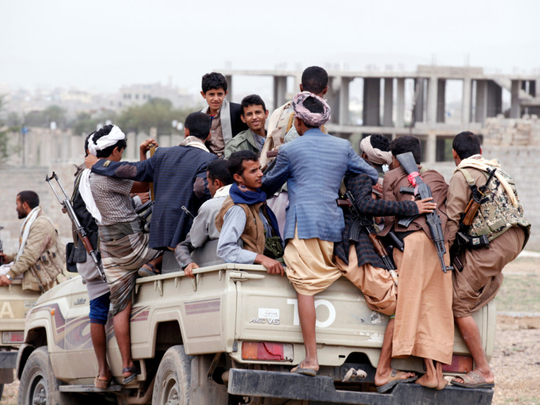
Al Houthis and former Yemeni president Al Abdullah Saleh failed miserably with the meeting of their alleged parliament held on Saturday, said Saudi Arabia’s Al Yaum.
“The fact that less than one third of members attended the meeting has stripped the parliament of its legal status. The legitimate Yemeni President Abd Rabbo Mansour Hadi had warned Al Houthi militia and Saleh from such childish acts. After all, responding to rebels’ invitation would be a flagrant violation of the Yemeni constitution and international conventions that do not recognise the rebels’ activities. The event signals the imminent triumph of righteousness over injustice and clearly reflects the rebels’ failure in marginalising the Yemeni legitimacy. Al Houthis and Saleh failed in their objectives to randomly shell the homes of Yemenis, place Yemeni cities under siege and fire rockets into Saudi Arabian lands. The successive victories of the Arab Coalition and legitimate forces are applying the final touches for the rebels’ impending end.”
Instead of adopting the process of dialogue, Al Houthis instead chose the option of military action, which will only inflict more pain on the people, said UAE’s Al Khaleej. “Al Houthi’s risky venture will only lead to more misery and chaos. They chose to forsake rationale and logic. Following the conclusion of talks in Kuwait, the rebels resorted to another option, such as setting up a political council that includes them and Saleh’s groups. In short, if Al Houthis are unwilling to adopt peace, then it will only pave the way for military action. This is an option that the legitimate government has avoided as much as possible to protect peoples’ lives and Yemen’s unity, which are under threat due to the danger posed by the rebels who are willing to drag Yemen into chaos.”
Even though Yemen’s parliament requires a quorum of 151 MPs from its 301 members, only 91 attended despite the threats against the lives lawmakers and those of their relatives, said Lebanon’s Daily Star.
“But like a kangaroo parliament, they approved the council, even though no such body is stipulated either by the constitution or UN resolutions. This was coupled with a surge in violence, mainly the constant firing of missiles toward Saudi territory, and marked the death knell for the precarious truce that barely held for a few months, returning the whole conflict to square one. The writing is on the wall. After the failure of their violent coup, Al Houthis and their allies have gone to Plan B by carrying out a second coup, this time framed by politics. But the demise of such a plan lies in its formation and can only lead to more killings, misery and destruction because for the time being it has buried any mediation or political efforts, whether by Arab or international entities.”
The UAE’s aid and support for Yemen projects a clear image of the responsibility the UAE feels towards its Arab brothers, said UAE’s Al Bayan. “His Highness Shaikh Mohammad Bin Zayed Al Nahyan, Abu Dhabi Crown Prince and Deputy Supreme Commander of the UAE Armed Forces, had emphasised that the UAE’s support and stand with the Yemeni people will continue so that Yemen can overcome security and economic challenges, achieve the national aspirations of the people and rebuild whatever was destroyed by the rebels. The UAE’s standing with Yemen and its people stems from its conviction on the importance of thwarting challenges and dangers, as well as foreign greed and interference in regional affairs.”





_resources1_16a31069e4e_small.jpg)






